ENTREPRENEURSHIP AND SMALL BUSINESSES MANAGEMENT Report - UK
VerifiedAdded on 2020/10/05
|19
|5363
|345
Report
AI Summary
This report provides a comprehensive analysis of entrepreneurship and small business management. It begins by defining entrepreneurship and outlining different types of entrepreneurial ventures, including small businesses, scalable startups, large company entrepreneurship, and social entrepreneurship, along with their respective characteristics, goals, and funding sources. The report then compares and contrasts these venture types, highlighting their similarities and differences. The study further assesses the impact of micro and small businesses on the UK economy, using relevant data and statistics to illustrate their contribution to economic growth, industry impact, societal development, and job creation, especially in the context of Brexit. The report also explores the characteristics, traits, and skills of successful entrepreneurs, and examines how background and experience can influence entrepreneurial success. The report concludes by summarizing the key findings and emphasizing the importance of entrepreneurship in the UK's economic landscape.

ENTREPRENEURSHIP AND
SMALL BUSINESSES
MANAGEMENT
SMALL BUSINESSES
MANAGEMENT
Paraphrase This Document
Need a fresh take? Get an instant paraphrase of this document with our AI Paraphraser
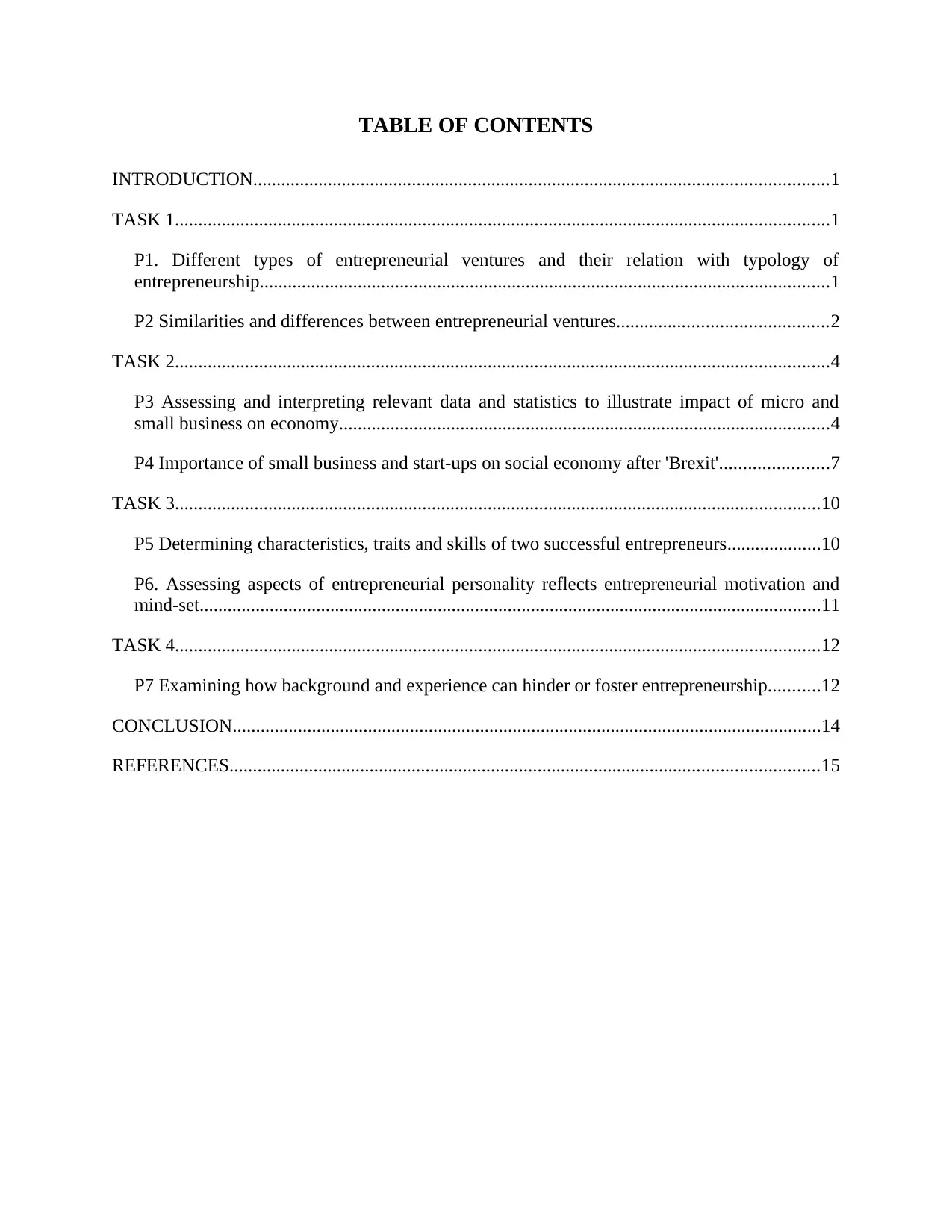
TABLE OF CONTENTS
INTRODUCTION...........................................................................................................................1
TASK 1............................................................................................................................................1
P1. Different types of entrepreneurial ventures and their relation with typology of
entrepreneurship..........................................................................................................................1
P2 Similarities and differences between entrepreneurial ventures.............................................2
TASK 2............................................................................................................................................4
P3 Assessing and interpreting relevant data and statistics to illustrate impact of micro and
small business on economy.........................................................................................................4
P4 Importance of small business and start-ups on social economy after 'Brexit'.......................7
TASK 3..........................................................................................................................................10
P5 Determining characteristics, traits and skills of two successful entrepreneurs....................10
P6. Assessing aspects of entrepreneurial personality reflects entrepreneurial motivation and
mind-set.....................................................................................................................................11
TASK 4..........................................................................................................................................12
P7 Examining how background and experience can hinder or foster entrepreneurship...........12
CONCLUSION..............................................................................................................................14
REFERENCES..............................................................................................................................15
INTRODUCTION...........................................................................................................................1
TASK 1............................................................................................................................................1
P1. Different types of entrepreneurial ventures and their relation with typology of
entrepreneurship..........................................................................................................................1
P2 Similarities and differences between entrepreneurial ventures.............................................2
TASK 2............................................................................................................................................4
P3 Assessing and interpreting relevant data and statistics to illustrate impact of micro and
small business on economy.........................................................................................................4
P4 Importance of small business and start-ups on social economy after 'Brexit'.......................7
TASK 3..........................................................................................................................................10
P5 Determining characteristics, traits and skills of two successful entrepreneurs....................10
P6. Assessing aspects of entrepreneurial personality reflects entrepreneurial motivation and
mind-set.....................................................................................................................................11
TASK 4..........................................................................................................................................12
P7 Examining how background and experience can hinder or foster entrepreneurship...........12
CONCLUSION..............................................................................................................................14
REFERENCES..............................................................................................................................15

ILLUSTRATION INDEX
Illustration 1: Private sector business in UK....................................................................................5
Illustration 2: SMEs Performance....................................................................................................7
Illustration 3: Impact of Brexit on SMEs.........................................................................................8
Illustration 4: The Brexit Cost in United Kingdom.........................................................................9
Illustration 5: GDP Global Growth Forecast...................................................................................9
Illustration 1: Private sector business in UK....................................................................................5
Illustration 2: SMEs Performance....................................................................................................7
Illustration 3: Impact of Brexit on SMEs.........................................................................................8
Illustration 4: The Brexit Cost in United Kingdom.........................................................................9
Illustration 5: GDP Global Growth Forecast...................................................................................9
⊘ This is a preview!⊘
Do you want full access?
Subscribe today to unlock all pages.

Trusted by 1+ million students worldwide
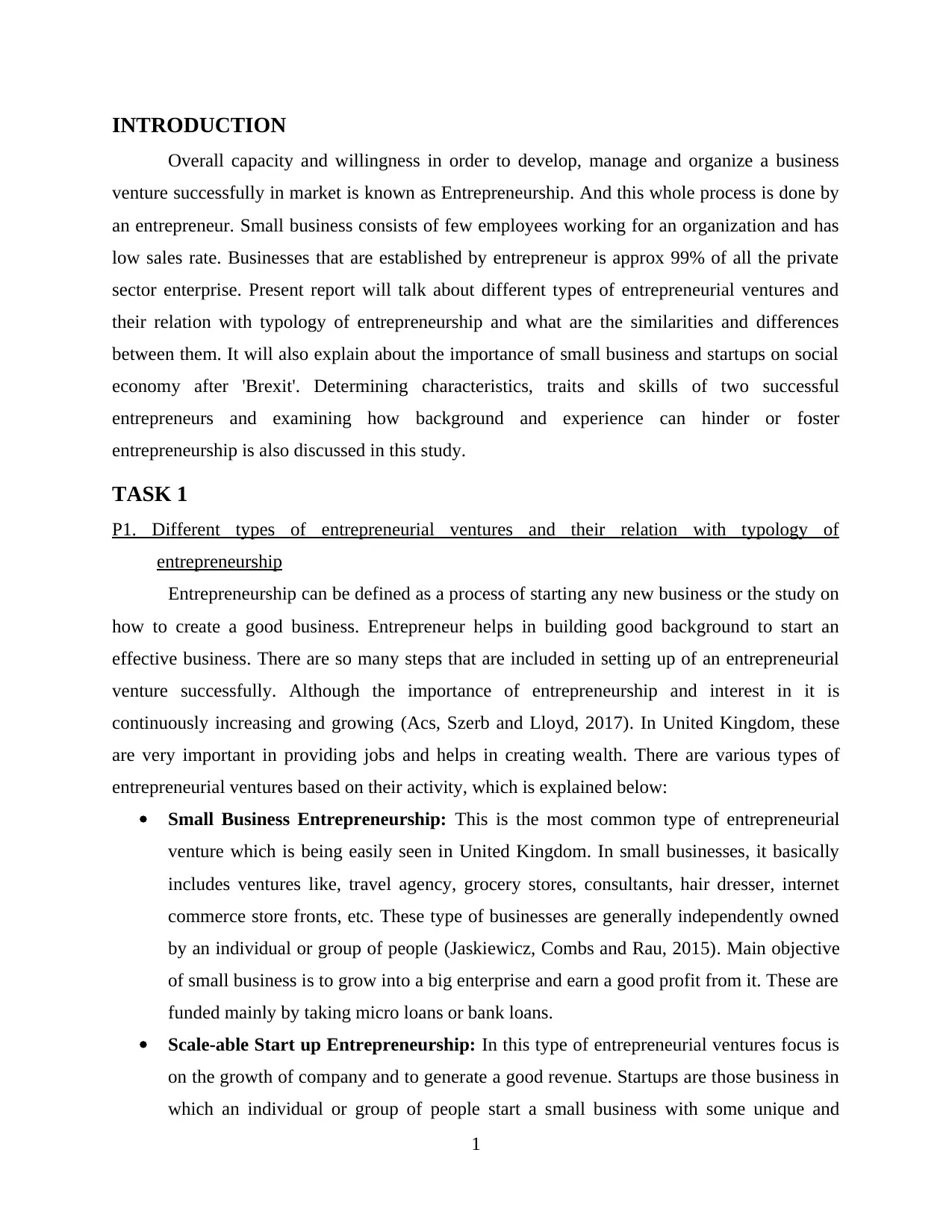
INTRODUCTION
Overall capacity and willingness in order to develop, manage and organize a business
venture successfully in market is known as Entrepreneurship. And this whole process is done by
an entrepreneur. Small business consists of few employees working for an organization and has
low sales rate. Businesses that are established by entrepreneur is approx 99% of all the private
sector enterprise. Present report will talk about different types of entrepreneurial ventures and
their relation with typology of entrepreneurship and what are the similarities and differences
between them. It will also explain about the importance of small business and startups on social
economy after 'Brexit'. Determining characteristics, traits and skills of two successful
entrepreneurs and examining how background and experience can hinder or foster
entrepreneurship is also discussed in this study.
TASK 1
P1. Different types of entrepreneurial ventures and their relation with typology of
entrepreneurship
Entrepreneurship can be defined as a process of starting any new business or the study on
how to create a good business. Entrepreneur helps in building good background to start an
effective business. There are so many steps that are included in setting up of an entrepreneurial
venture successfully. Although the importance of entrepreneurship and interest in it is
continuously increasing and growing (Acs, Szerb and Lloyd, 2017). In United Kingdom, these
are very important in providing jobs and helps in creating wealth. There are various types of
entrepreneurial ventures based on their activity, which is explained below:
Small Business Entrepreneurship: This is the most common type of entrepreneurial
venture which is being easily seen in United Kingdom. In small businesses, it basically
includes ventures like, travel agency, grocery stores, consultants, hair dresser, internet
commerce store fronts, etc. These type of businesses are generally independently owned
by an individual or group of people (Jaskiewicz, Combs and Rau, 2015). Main objective
of small business is to grow into a big enterprise and earn a good profit from it. These are
funded mainly by taking micro loans or bank loans.
Scale-able Start up Entrepreneurship: In this type of entrepreneurial ventures focus is
on the growth of company and to generate a good revenue. Startups are those business in
which an individual or group of people start a small business with some unique and
1
Overall capacity and willingness in order to develop, manage and organize a business
venture successfully in market is known as Entrepreneurship. And this whole process is done by
an entrepreneur. Small business consists of few employees working for an organization and has
low sales rate. Businesses that are established by entrepreneur is approx 99% of all the private
sector enterprise. Present report will talk about different types of entrepreneurial ventures and
their relation with typology of entrepreneurship and what are the similarities and differences
between them. It will also explain about the importance of small business and startups on social
economy after 'Brexit'. Determining characteristics, traits and skills of two successful
entrepreneurs and examining how background and experience can hinder or foster
entrepreneurship is also discussed in this study.
TASK 1
P1. Different types of entrepreneurial ventures and their relation with typology of
entrepreneurship
Entrepreneurship can be defined as a process of starting any new business or the study on
how to create a good business. Entrepreneur helps in building good background to start an
effective business. There are so many steps that are included in setting up of an entrepreneurial
venture successfully. Although the importance of entrepreneurship and interest in it is
continuously increasing and growing (Acs, Szerb and Lloyd, 2017). In United Kingdom, these
are very important in providing jobs and helps in creating wealth. There are various types of
entrepreneurial ventures based on their activity, which is explained below:
Small Business Entrepreneurship: This is the most common type of entrepreneurial
venture which is being easily seen in United Kingdom. In small businesses, it basically
includes ventures like, travel agency, grocery stores, consultants, hair dresser, internet
commerce store fronts, etc. These type of businesses are generally independently owned
by an individual or group of people (Jaskiewicz, Combs and Rau, 2015). Main objective
of small business is to grow into a big enterprise and earn a good profit from it. These are
funded mainly by taking micro loans or bank loans.
Scale-able Start up Entrepreneurship: In this type of entrepreneurial ventures focus is
on the growth of company and to generate a good revenue. Startups are those business in
which an individual or group of people start a small business with some unique and
1
Paraphrase This Document
Need a fresh take? Get an instant paraphrase of this document with our AI Paraphraser
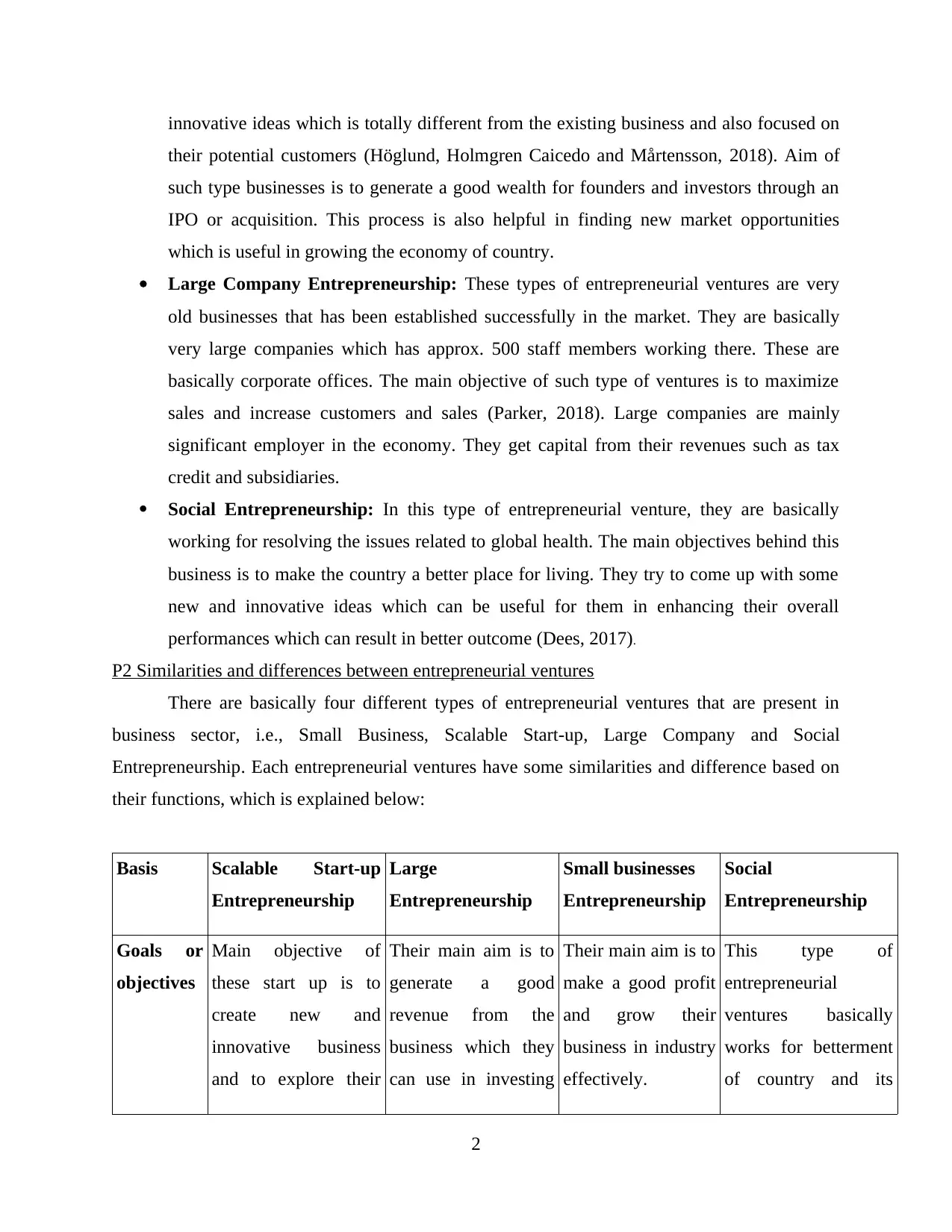
innovative ideas which is totally different from the existing business and also focused on
their potential customers (Höglund, Holmgren Caicedo and Mårtensson, 2018). Aim of
such type businesses is to generate a good wealth for founders and investors through an
IPO or acquisition. This process is also helpful in finding new market opportunities
which is useful in growing the economy of country.
Large Company Entrepreneurship: These types of entrepreneurial ventures are very
old businesses that has been established successfully in the market. They are basically
very large companies which has approx. 500 staff members working there. These are
basically corporate offices. The main objective of such type of ventures is to maximize
sales and increase customers and sales (Parker, 2018). Large companies are mainly
significant employer in the economy. They get capital from their revenues such as tax
credit and subsidiaries.
Social Entrepreneurship: In this type of entrepreneurial venture, they are basically
working for resolving the issues related to global health. The main objectives behind this
business is to make the country a better place for living. They try to come up with some
new and innovative ideas which can be useful for them in enhancing their overall
performances which can result in better outcome (Dees, 2017).
P2 Similarities and differences between entrepreneurial ventures
There are basically four different types of entrepreneurial ventures that are present in
business sector, i.e., Small Business, Scalable Start-up, Large Company and Social
Entrepreneurship. Each entrepreneurial ventures have some similarities and difference based on
their functions, which is explained below:
Basis Scalable Start-up
Entrepreneurship
Large
Entrepreneurship
Small businesses
Entrepreneurship
Social
Entrepreneurship
Goals or
objectives
Main objective of
these start up is to
create new and
innovative business
and to explore their
Their main aim is to
generate a good
revenue from the
business which they
can use in investing
Their main aim is to
make a good profit
and grow their
business in industry
effectively.
This type of
entrepreneurial
ventures basically
works for betterment
of country and its
2
their potential customers (Höglund, Holmgren Caicedo and Mårtensson, 2018). Aim of
such type businesses is to generate a good wealth for founders and investors through an
IPO or acquisition. This process is also helpful in finding new market opportunities
which is useful in growing the economy of country.
Large Company Entrepreneurship: These types of entrepreneurial ventures are very
old businesses that has been established successfully in the market. They are basically
very large companies which has approx. 500 staff members working there. These are
basically corporate offices. The main objective of such type of ventures is to maximize
sales and increase customers and sales (Parker, 2018). Large companies are mainly
significant employer in the economy. They get capital from their revenues such as tax
credit and subsidiaries.
Social Entrepreneurship: In this type of entrepreneurial venture, they are basically
working for resolving the issues related to global health. The main objectives behind this
business is to make the country a better place for living. They try to come up with some
new and innovative ideas which can be useful for them in enhancing their overall
performances which can result in better outcome (Dees, 2017).
P2 Similarities and differences between entrepreneurial ventures
There are basically four different types of entrepreneurial ventures that are present in
business sector, i.e., Small Business, Scalable Start-up, Large Company and Social
Entrepreneurship. Each entrepreneurial ventures have some similarities and difference based on
their functions, which is explained below:
Basis Scalable Start-up
Entrepreneurship
Large
Entrepreneurship
Small businesses
Entrepreneurship
Social
Entrepreneurship
Goals or
objectives
Main objective of
these start up is to
create new and
innovative business
and to explore their
Their main aim is to
generate a good
revenue from the
business which they
can use in investing
Their main aim is to
make a good profit
and grow their
business in industry
effectively.
This type of
entrepreneurial
ventures basically
works for betterment
of country and its
2
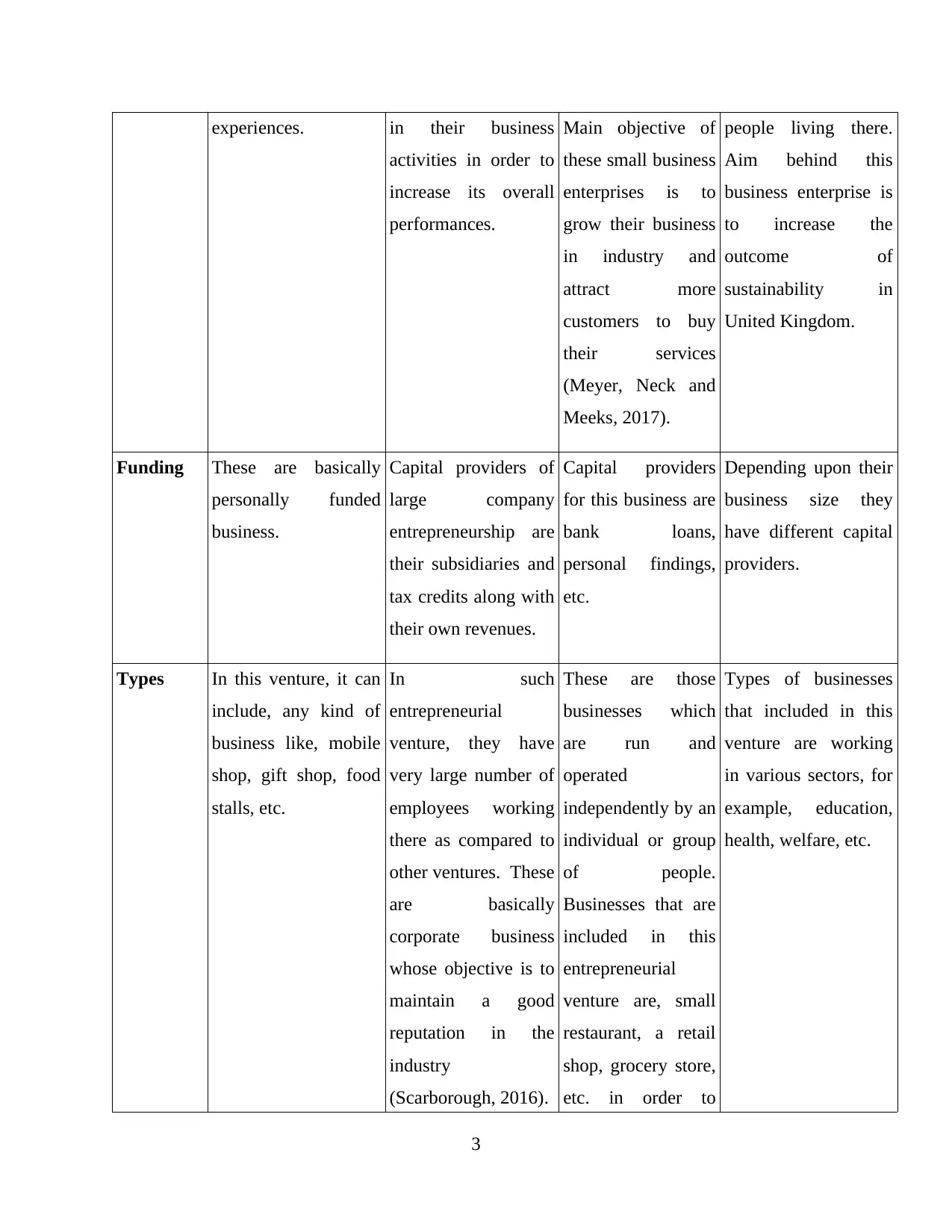
experiences. in their business
activities in order to
increase its overall
performances.
Main objective of
these small business
enterprises is to
grow their business
in industry and
attract more
customers to buy
their services
(Meyer, Neck and
Meeks, 2017).
people living there.
Aim behind this
business enterprise is
to increase the
outcome of
sustainability in
United Kingdom.
Funding These are basically
personally funded
business.
Capital providers of
large company
entrepreneurship are
their subsidiaries and
tax credits along with
their own revenues.
Capital providers
for this business are
bank loans,
personal findings,
etc.
Depending upon their
business size they
have different capital
providers.
Types In this venture, it can
include, any kind of
business like, mobile
shop, gift shop, food
stalls, etc.
In such
entrepreneurial
venture, they have
very large number of
employees working
there as compared to
other ventures. These
are basically
corporate business
whose objective is to
maintain a good
reputation in the
industry
(Scarborough, 2016).
These are those
businesses which
are run and
operated
independently by an
individual or group
of people.
Businesses that are
included in this
entrepreneurial
venture are, small
restaurant, a retail
shop, grocery store,
etc. in order to
Types of businesses
that included in this
venture are working
in various sectors, for
example, education,
health, welfare, etc.
3
activities in order to
increase its overall
performances.
Main objective of
these small business
enterprises is to
grow their business
in industry and
attract more
customers to buy
their services
(Meyer, Neck and
Meeks, 2017).
people living there.
Aim behind this
business enterprise is
to increase the
outcome of
sustainability in
United Kingdom.
Funding These are basically
personally funded
business.
Capital providers of
large company
entrepreneurship are
their subsidiaries and
tax credits along with
their own revenues.
Capital providers
for this business are
bank loans,
personal findings,
etc.
Depending upon their
business size they
have different capital
providers.
Types In this venture, it can
include, any kind of
business like, mobile
shop, gift shop, food
stalls, etc.
In such
entrepreneurial
venture, they have
very large number of
employees working
there as compared to
other ventures. These
are basically
corporate business
whose objective is to
maintain a good
reputation in the
industry
(Scarborough, 2016).
These are those
businesses which
are run and
operated
independently by an
individual or group
of people.
Businesses that are
included in this
entrepreneurial
venture are, small
restaurant, a retail
shop, grocery store,
etc. in order to
Types of businesses
that included in this
venture are working
in various sectors, for
example, education,
health, welfare, etc.
3
⊘ This is a preview!⊘
Do you want full access?
Subscribe today to unlock all pages.

Trusted by 1+ million students worldwide
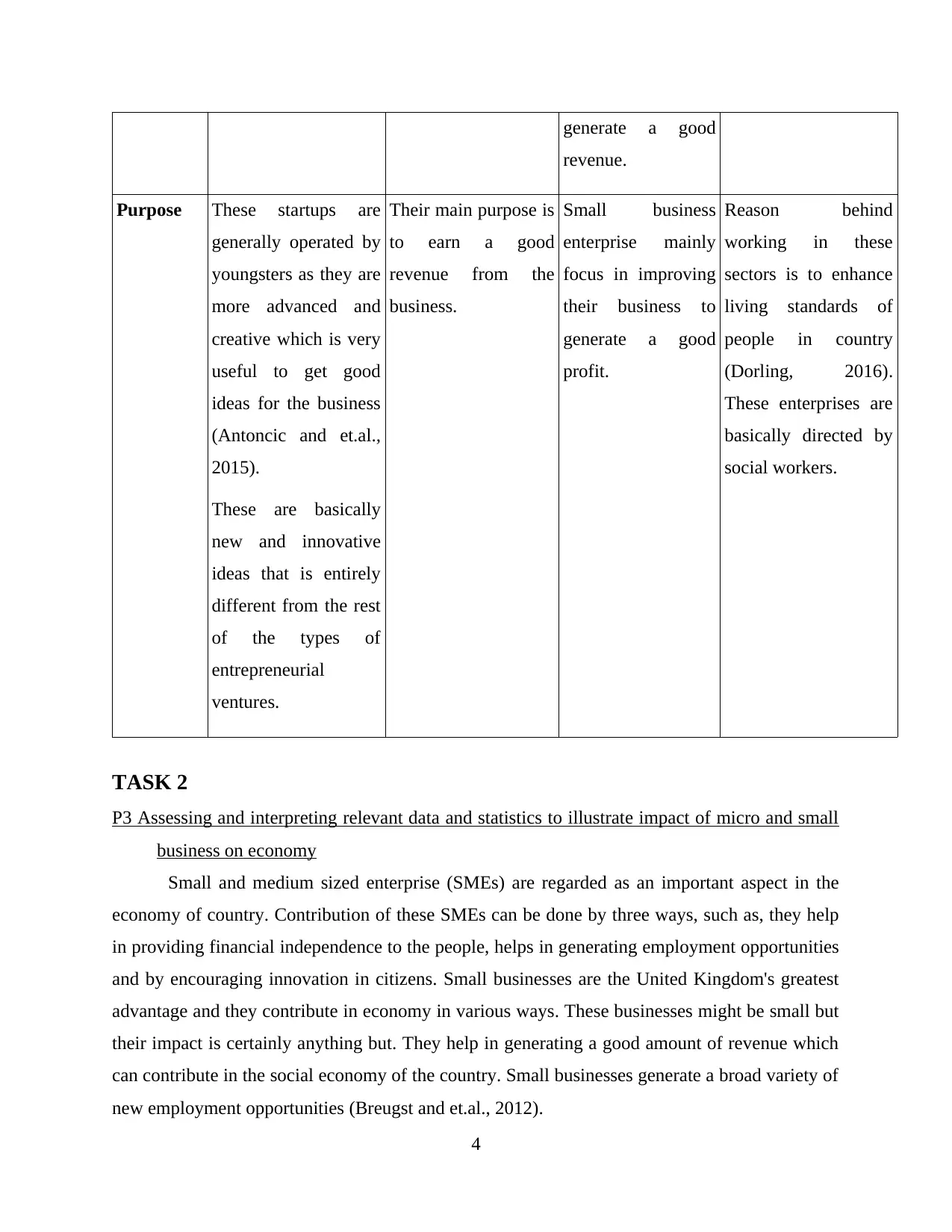
generate a good
revenue.
Purpose These startups are
generally operated by
youngsters as they are
more advanced and
creative which is very
useful to get good
ideas for the business
(Antoncic and et.al.,
2015).
These are basically
new and innovative
ideas that is entirely
different from the rest
of the types of
entrepreneurial
ventures.
Their main purpose is
to earn a good
revenue from the
business.
Small business
enterprise mainly
focus in improving
their business to
generate a good
profit.
Reason behind
working in these
sectors is to enhance
living standards of
people in country
(Dorling, 2016).
These enterprises are
basically directed by
social workers.
TASK 2
P3 Assessing and interpreting relevant data and statistics to illustrate impact of micro and small
business on economy
Small and medium sized enterprise (SMEs) are regarded as an important aspect in the
economy of country. Contribution of these SMEs can be done by three ways, such as, they help
in providing financial independence to the people, helps in generating employment opportunities
and by encouraging innovation in citizens. Small businesses are the United Kingdom's greatest
advantage and they contribute in economy in various ways. These businesses might be small but
their impact is certainly anything but. They help in generating a good amount of revenue which
can contribute in the social economy of the country. Small businesses generate a broad variety of
new employment opportunities (Breugst and et.al., 2012).
4
revenue.
Purpose These startups are
generally operated by
youngsters as they are
more advanced and
creative which is very
useful to get good
ideas for the business
(Antoncic and et.al.,
2015).
These are basically
new and innovative
ideas that is entirely
different from the rest
of the types of
entrepreneurial
ventures.
Their main purpose is
to earn a good
revenue from the
business.
Small business
enterprise mainly
focus in improving
their business to
generate a good
profit.
Reason behind
working in these
sectors is to enhance
living standards of
people in country
(Dorling, 2016).
These enterprises are
basically directed by
social workers.
TASK 2
P3 Assessing and interpreting relevant data and statistics to illustrate impact of micro and small
business on economy
Small and medium sized enterprise (SMEs) are regarded as an important aspect in the
economy of country. Contribution of these SMEs can be done by three ways, such as, they help
in providing financial independence to the people, helps in generating employment opportunities
and by encouraging innovation in citizens. Small businesses are the United Kingdom's greatest
advantage and they contribute in economy in various ways. These businesses might be small but
their impact is certainly anything but. They help in generating a good amount of revenue which
can contribute in the social economy of the country. Small businesses generate a broad variety of
new employment opportunities (Breugst and et.al., 2012).
4
Paraphrase This Document
Need a fresh take? Get an instant paraphrase of this document with our AI Paraphraser
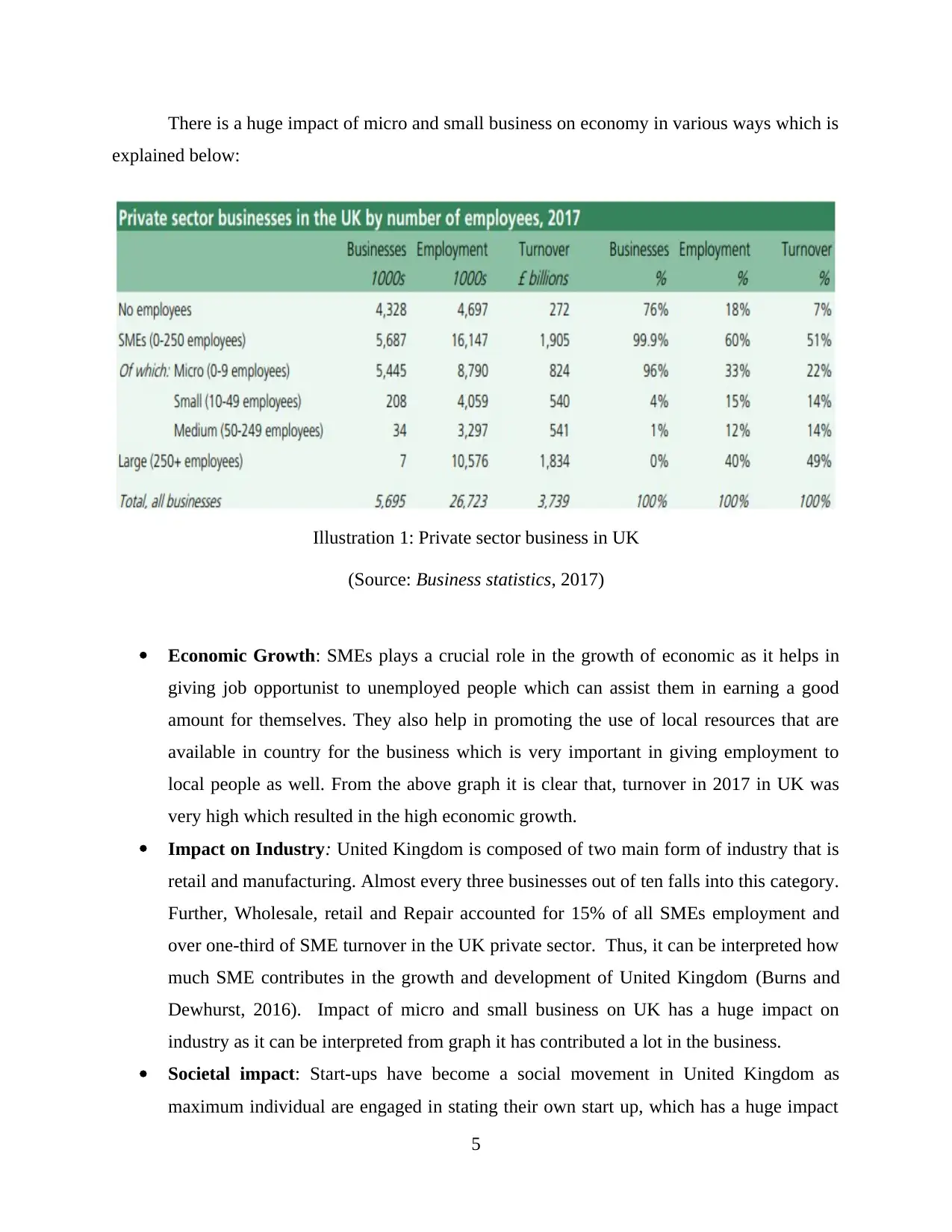
There is a huge impact of micro and small business on economy in various ways which is
explained below:
Economic Growth: SMEs plays a crucial role in the growth of economic as it helps in
giving job opportunist to unemployed people which can assist them in earning a good
amount for themselves. They also help in promoting the use of local resources that are
available in country for the business which is very important in giving employment to
local people as well. From the above graph it is clear that, turnover in 2017 in UK was
very high which resulted in the high economic growth.
Impact on Industry: United Kingdom is composed of two main form of industry that is
retail and manufacturing. Almost every three businesses out of ten falls into this category.
Further, Wholesale, retail and Repair accounted for 15% of all SMEs employment and
over one-third of SME turnover in the UK private sector. Thus, it can be interpreted how
much SME contributes in the growth and development of United Kingdom (Burns and
Dewhurst, 2016). Impact of micro and small business on UK has a huge impact on
industry as it can be interpreted from graph it has contributed a lot in the business.
Societal impact: Start-ups have become a social movement in United Kingdom as
maximum individual are engaged in stating their own start up, which has a huge impact
5
Illustration 1: Private sector business in UK
(Source: Business statistics, 2017)
explained below:
Economic Growth: SMEs plays a crucial role in the growth of economic as it helps in
giving job opportunist to unemployed people which can assist them in earning a good
amount for themselves. They also help in promoting the use of local resources that are
available in country for the business which is very important in giving employment to
local people as well. From the above graph it is clear that, turnover in 2017 in UK was
very high which resulted in the high economic growth.
Impact on Industry: United Kingdom is composed of two main form of industry that is
retail and manufacturing. Almost every three businesses out of ten falls into this category.
Further, Wholesale, retail and Repair accounted for 15% of all SMEs employment and
over one-third of SME turnover in the UK private sector. Thus, it can be interpreted how
much SME contributes in the growth and development of United Kingdom (Burns and
Dewhurst, 2016). Impact of micro and small business on UK has a huge impact on
industry as it can be interpreted from graph it has contributed a lot in the business.
Societal impact: Start-ups have become a social movement in United Kingdom as
maximum individual are engaged in stating their own start up, which has a huge impact
5
Illustration 1: Private sector business in UK
(Source: Business statistics, 2017)
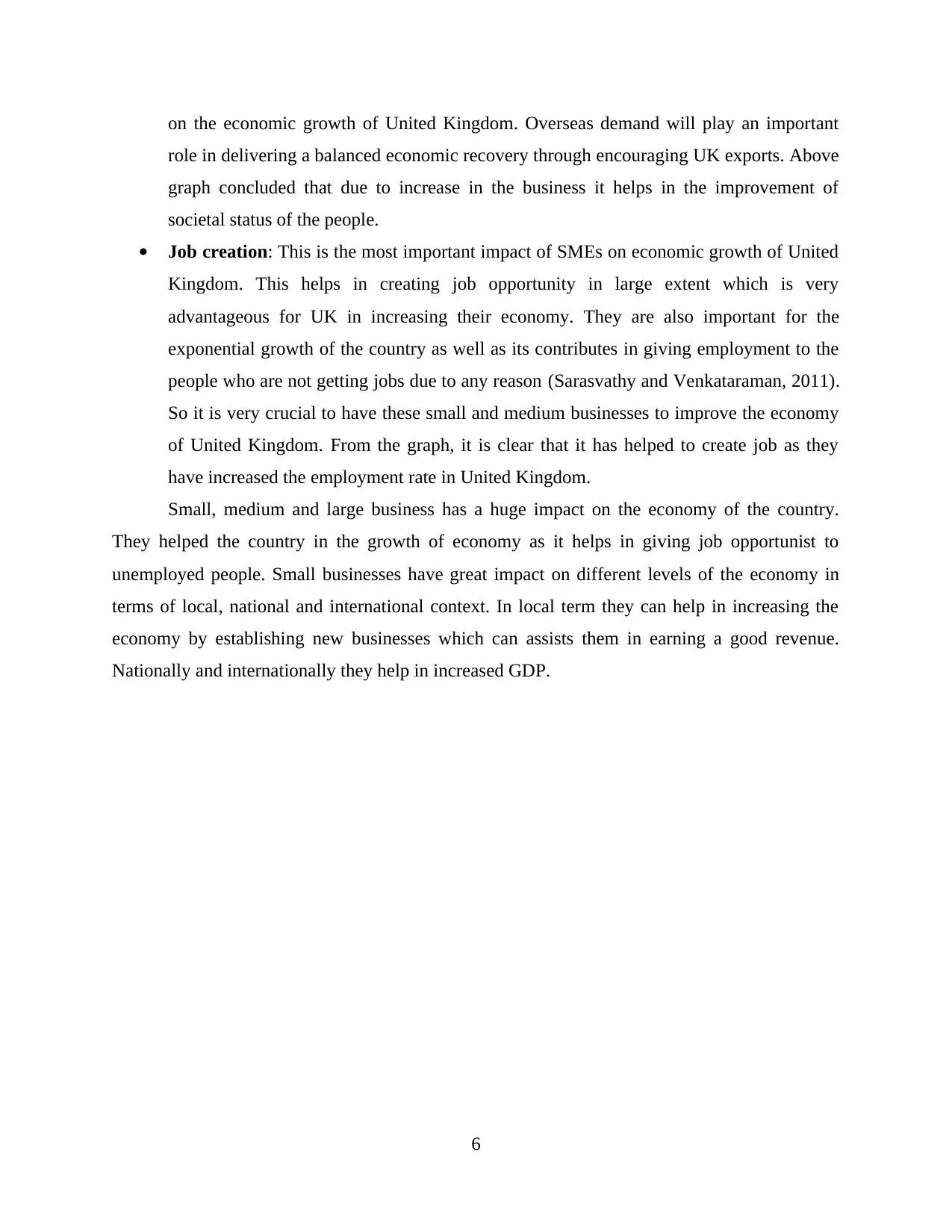
on the economic growth of United Kingdom. Overseas demand will play an important
role in delivering a balanced economic recovery through encouraging UK exports. Above
graph concluded that due to increase in the business it helps in the improvement of
societal status of the people.
Job creation: This is the most important impact of SMEs on economic growth of United
Kingdom. This helps in creating job opportunity in large extent which is very
advantageous for UK in increasing their economy. They are also important for the
exponential growth of the country as well as its contributes in giving employment to the
people who are not getting jobs due to any reason (Sarasvathy and Venkataraman, 2011).
So it is very crucial to have these small and medium businesses to improve the economy
of United Kingdom. From the graph, it is clear that it has helped to create job as they
have increased the employment rate in United Kingdom.
Small, medium and large business has a huge impact on the economy of the country.
They helped the country in the growth of economy as it helps in giving job opportunist to
unemployed people. Small businesses have great impact on different levels of the economy in
terms of local, national and international context. In local term they can help in increasing the
economy by establishing new businesses which can assists them in earning a good revenue.
Nationally and internationally they help in increased GDP.
6
role in delivering a balanced economic recovery through encouraging UK exports. Above
graph concluded that due to increase in the business it helps in the improvement of
societal status of the people.
Job creation: This is the most important impact of SMEs on economic growth of United
Kingdom. This helps in creating job opportunity in large extent which is very
advantageous for UK in increasing their economy. They are also important for the
exponential growth of the country as well as its contributes in giving employment to the
people who are not getting jobs due to any reason (Sarasvathy and Venkataraman, 2011).
So it is very crucial to have these small and medium businesses to improve the economy
of United Kingdom. From the graph, it is clear that it has helped to create job as they
have increased the employment rate in United Kingdom.
Small, medium and large business has a huge impact on the economy of the country.
They helped the country in the growth of economy as it helps in giving job opportunist to
unemployed people. Small businesses have great impact on different levels of the economy in
terms of local, national and international context. In local term they can help in increasing the
economy by establishing new businesses which can assists them in earning a good revenue.
Nationally and internationally they help in increased GDP.
6
⊘ This is a preview!⊘
Do you want full access?
Subscribe today to unlock all pages.

Trusted by 1+ million students worldwide
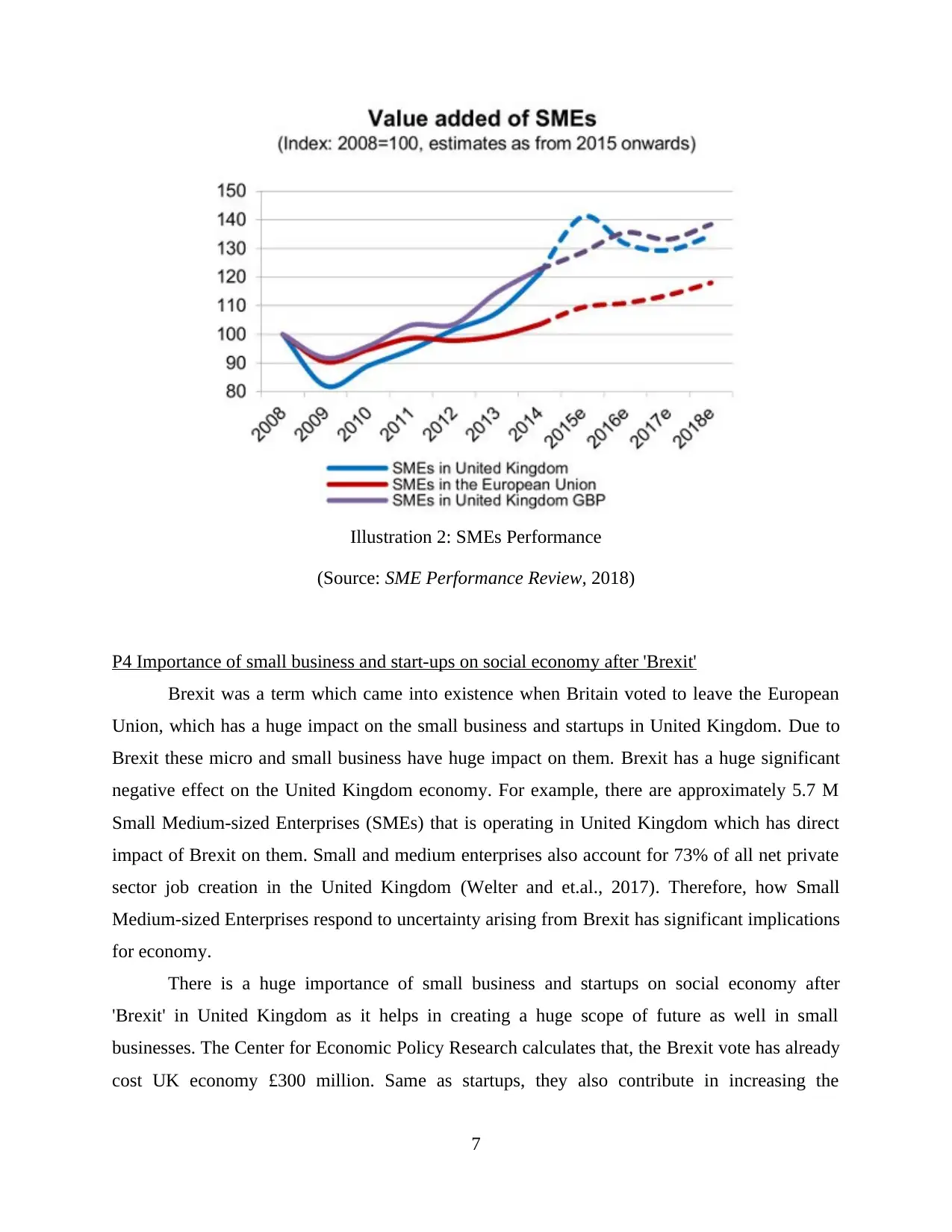
P4 Importance of small business and start-ups on social economy after 'Brexit'
Brexit was a term which came into existence when Britain voted to leave the European
Union, which has a huge impact on the small business and startups in United Kingdom. Due to
Brexit these micro and small business have huge impact on them. Brexit has a huge significant
negative effect on the United Kingdom economy. For example, there are approximately 5.7 M
Small Medium-sized Enterprises (SMEs) that is operating in United Kingdom which has direct
impact of Brexit on them. Small and medium enterprises also account for 73% of all net private
sector job creation in the United Kingdom (Welter and et.al., 2017). Therefore, how Small
Medium-sized Enterprises respond to uncertainty arising from Brexit has significant implications
for economy.
There is a huge importance of small business and startups on social economy after
'Brexit' in United Kingdom as it helps in creating a huge scope of future as well in small
businesses. The Center for Economic Policy Research calculates that, the Brexit vote has already
cost UK economy £300 million. Same as startups, they also contribute in increasing the
7
Illustration 2: SMEs Performance
(Source: SME Performance Review, 2018)
Brexit was a term which came into existence when Britain voted to leave the European
Union, which has a huge impact on the small business and startups in United Kingdom. Due to
Brexit these micro and small business have huge impact on them. Brexit has a huge significant
negative effect on the United Kingdom economy. For example, there are approximately 5.7 M
Small Medium-sized Enterprises (SMEs) that is operating in United Kingdom which has direct
impact of Brexit on them. Small and medium enterprises also account for 73% of all net private
sector job creation in the United Kingdom (Welter and et.al., 2017). Therefore, how Small
Medium-sized Enterprises respond to uncertainty arising from Brexit has significant implications
for economy.
There is a huge importance of small business and startups on social economy after
'Brexit' in United Kingdom as it helps in creating a huge scope of future as well in small
businesses. The Center for Economic Policy Research calculates that, the Brexit vote has already
cost UK economy £300 million. Same as startups, they also contribute in increasing the
7
Illustration 2: SMEs Performance
(Source: SME Performance Review, 2018)
Paraphrase This Document
Need a fresh take? Get an instant paraphrase of this document with our AI Paraphraser
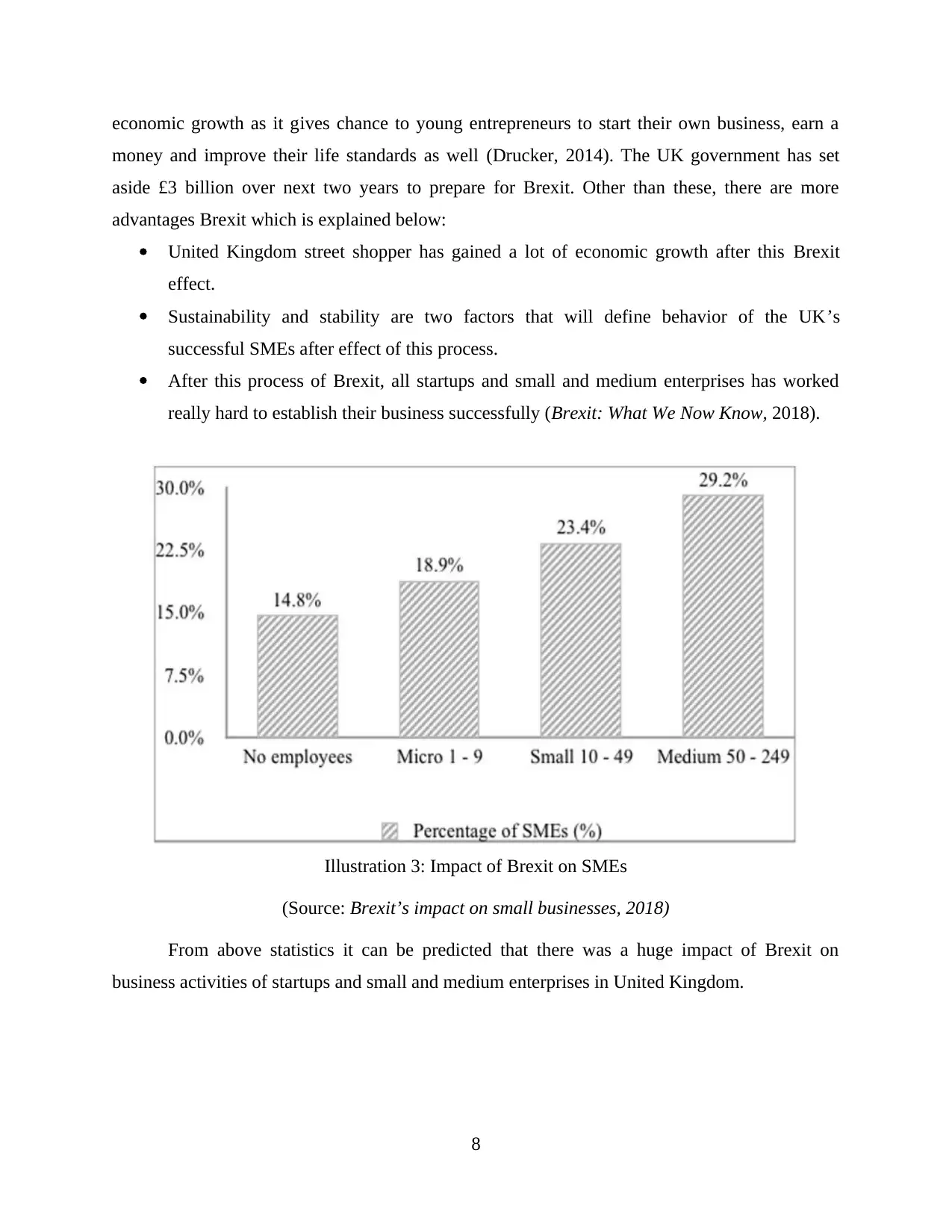
economic growth as it gives chance to young entrepreneurs to start their own business, earn a
money and improve their life standards as well (Drucker, 2014). The UK government has set
aside £3 billion over next two years to prepare for Brexit. Other than these, there are more
advantages Brexit which is explained below:
United Kingdom street shopper has gained a lot of economic growth after this Brexit
effect.
Sustainability and stability are two factors that will define behavior of the UK’s
successful SMEs after effect of this process.
After this process of Brexit, all startups and small and medium enterprises has worked
really hard to establish their business successfully (Brexit: What We Now Know, 2018).
From above statistics it can be predicted that there was a huge impact of Brexit on
business activities of startups and small and medium enterprises in United Kingdom.
8
Illustration 3: Impact of Brexit on SMEs
(Source: Brexit’s impact on small businesses, 2018)
money and improve their life standards as well (Drucker, 2014). The UK government has set
aside £3 billion over next two years to prepare for Brexit. Other than these, there are more
advantages Brexit which is explained below:
United Kingdom street shopper has gained a lot of economic growth after this Brexit
effect.
Sustainability and stability are two factors that will define behavior of the UK’s
successful SMEs after effect of this process.
After this process of Brexit, all startups and small and medium enterprises has worked
really hard to establish their business successfully (Brexit: What We Now Know, 2018).
From above statistics it can be predicted that there was a huge impact of Brexit on
business activities of startups and small and medium enterprises in United Kingdom.
8
Illustration 3: Impact of Brexit on SMEs
(Source: Brexit’s impact on small businesses, 2018)

9
Illustration 4: The Brexit Cost in United Kingdom
(Source: Brexit What we know, 2018)
Illustration 5: GDP Global Growth Forecast
(Source: Brexit What we know, 2018)
Illustration 4: The Brexit Cost in United Kingdom
(Source: Brexit What we know, 2018)
Illustration 5: GDP Global Growth Forecast
(Source: Brexit What we know, 2018)
⊘ This is a preview!⊘
Do you want full access?
Subscribe today to unlock all pages.

Trusted by 1+ million students worldwide
1 out of 19
Related Documents
Your All-in-One AI-Powered Toolkit for Academic Success.
+13062052269
info@desklib.com
Available 24*7 on WhatsApp / Email
![[object Object]](/_next/static/media/star-bottom.7253800d.svg)
Unlock your academic potential
Copyright © 2020–2026 A2Z Services. All Rights Reserved. Developed and managed by ZUCOL.





